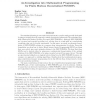Free Online Productivity Tools
i2Speak
i2Symbol
i2OCR
iTex2Img
iWeb2Print
iWeb2Shot
i2Type
iPdf2Split
iPdf2Merge
i2Bopomofo
i2Arabic
i2Style
i2Image
i2PDF
iLatex2Rtf
Sci2ools
141
click to vote
JAIR
2010
2010
An Investigation into Mathematical Programming for Finite Horizon Decentralized POMDPs
Decentralized planning in uncertain environments is a complex task generally dealt with by using a decision-theoretic approach, mainly through the framework of Decentralized Partially Observable Markov Decision Processes (DEC-POMDPs). Although DEC-POMDPS are a general and powerful modeling tool, solving them is a task with an overwhelming complexity that can be doubly exponential. In this paper, we study an alternate formulation of DEC-POMDPs relying on a sequence-form representation of policies. From this formulation, we show how to derive Mixed Integer Linear Programming (MILP) problems that, once solved, give exact optimal solutions to the DEC-POMDPs. We show that these MILPs can be derived either by using some combinatorial characteristics of the optimal solutions of the DEC-POMDPs or by using concepts borrowed from game theory. Through an experimental validation on classical test problems from the DEC-POMDP literature, we compare our approach to existing algorithms. Results show ...
| Added | 28 Jan 2011 |
| Updated | 28 Jan 2011 |
| Type | Journal |
| Year | 2010 |
| Where | JAIR |
| Authors | Raghav Aras, Alain Dutech |
Comments (0)

